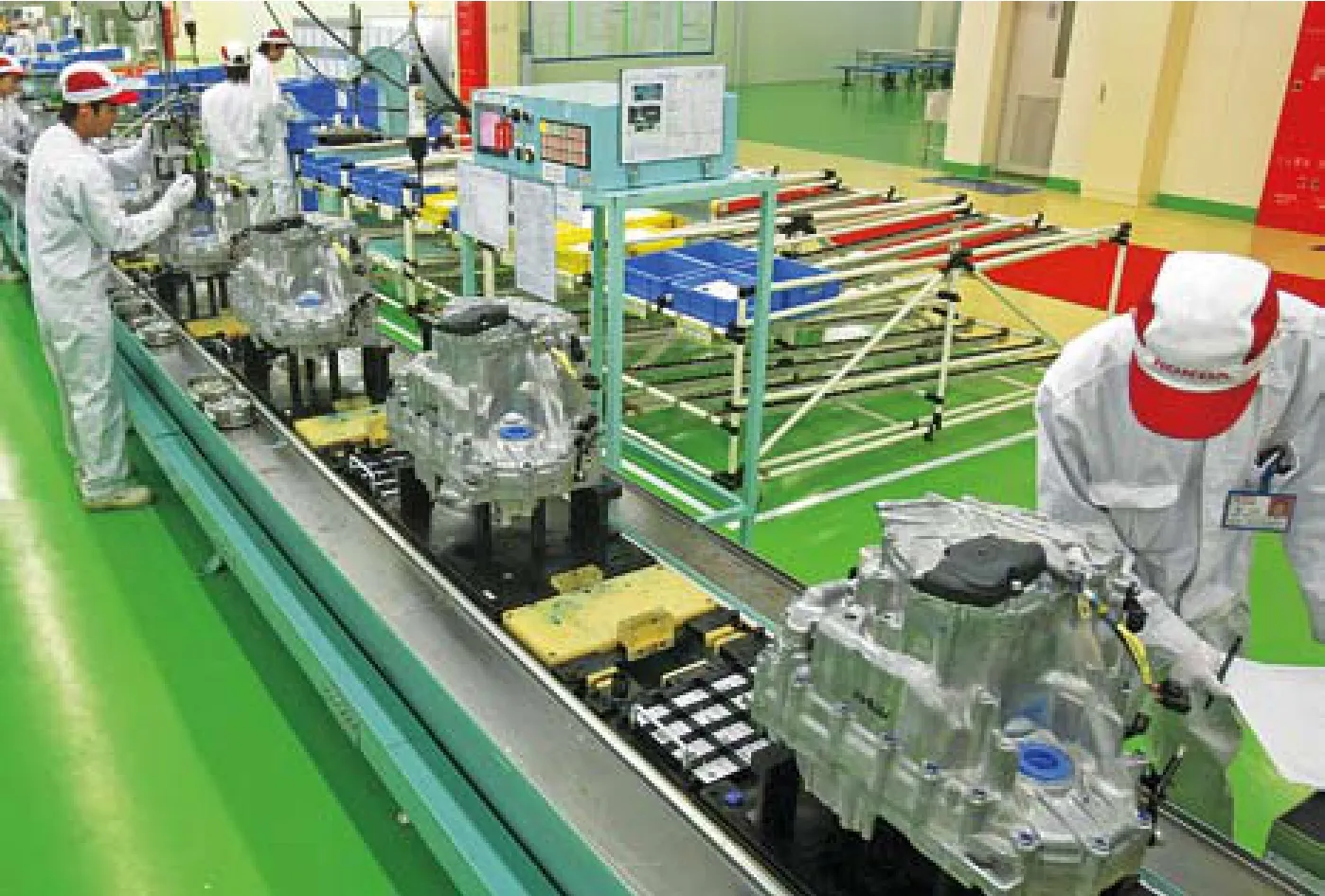Striking a Good Deal
2011-10-14ByWANGHAIRONG
By WANG HAIRONG
Striking a Good Deal
By WANG HAIRONG
Collective bargaining on wage at a Honda factory has set a precedent with potential ramifications for the whole economy
After months of negotiations, workers at Honda Auto Parts Manufacturing Co. in Foshan City, south China’s Guangdong Province, secured an increase of 611 yuan ($96), or 32 percent, to their monthly pay on June 25.
It was already the third time the factory’s workers had garnered a pay raise through collective bargaining in a year.
Labor relations experts said the fi rst collective bargaining in Honda’s Foshan facility,which took place a year earlier, also marked the fi rst successful instance of the negotiation process in China after 1949.
Workers started to negotiate for a salary increase after a strike broke out at the Honda facility on May 17, 2010. The 19-day strike was the “most in fl uential one in China since 1949,” said Kong Xianghong, Vice Chairman of the Guangdong Provincial Federation of Trade Unions.
The strike is distinctive as workers in this case were requesting long-term future bene fi ts rather than protesting a past grievance.
“A surge in strikes and labor disputes in China reveals the desire of the country’s working class, primarily a new generation of rural migrant workers, to be paid more than the government-set minimum wage,”said Qiao Jian, Director of the Department of Employment Relations of the China Institute of Industrial Relations.
Qiao said this phenomenon also indicated there was a need for China to begin to move away from an economic growth model built on cheap labor. “China should no longer power its economic growth mainly through export-oriented industrialization, instead it should boost domestic consumption and increase workers’ salaries,” he said.
Disgruntled workers
On the morning of May 17 last year,hundreds of workers at the Honda facility in Foshan’s Nanhai District made the unusual decision to stage a strike and demand a pay raise.
The strike took place days after Honda announced an aggressive plan to boost the annual production capacity of its joint venture with Guangzhou Automobile Group Co. Ltd.from 360,000 units to 480,000 vehicles by the end of 2011.
Honda is Japan’s second largest automaker and China is the company’s second largest overseas market, after the United States. In 2010, the company sold 655,000 vehicles in China, up 13 percent from the previous year.
Several hours after workers left their posts, the factory’s management promised to consider their demands and the workers returned to their jobs. Negotiations between workers’ representatives and the management proceeded in the following days.
Workers demanded an increase of 800 yuan ($125) to their monthly salary, and an annual pay raise of no less than 15 percent.
Before the strike, monthly salaries of front-line workers at the factory averaged 1,524 yuan ($239). But bonuses at mid-year and the year end brought workers’ average monthly income up to 1,852 yuan ($290).
Though the government-set minimum wage last year was 920 yuan ($144) per month, most of the workers were unsatis fi ed with their income “because of rising consumer prices,” a Foshan City of fi cial said.
Chen Cheng, a worker who began working at the factory in late 2010, said after the payment of social security premiums,he made only about 1,100 yuan ($172) per month, which Chen said could barely make ends meet. The factory’s Japanese executives were paid more than 100,000 yuan ($15,661)per month.
After two rounds of negotiations, the management agreed to give all employees, excluding interns at the factory, a pay raise of 55 yuan ($8.5). The offer enraged the workers.
As discontent within the factory spread,on May 22, the management announced the dismissal of two of the strike’s leaders,which worsened the situation. Following the announcement, all 1,800 workers went on strike, which, due to streamlined production,led to production halts in three other Honda facilities in China.
While the strike, which lasted over two weeks, crippled Honda’s manufacturing operations in China, workers were unhappy about the role played by their trade union.They felt trade union of fi cials in the factory tended to behave as a fi gurehead that was blind to workers’ real needs and accused them of even playing the role of a strike breaker. On May 24, workers requested a change of leadership of the factory’s trade union.
On June 4, representatives of workers and the management negotiated again.Chang Kai, a labor law professor at the Beijing-based Renmin University of China,participated in the negotiation as the workers’legal consultant.

ON STRIKE: Hundreds of striking workers of Honda Auto Parts Manufacturing Co. in Foshan City, Guangdong Province, gather at the gate of their company on May 26, 2010
After hours of negotiation, the two sides agreed to a 24-percent pay hike and production at Honda’s Foshan facility resumed.
Following the strike, workers elected the new leadership of the factory’s trade union.The new leaders have successfully struck two further collective bargains with the factory’s management.
At the end of 2010, the management offered workers a bonus equivalent to two months’ standard wages plus some merit pay.Workers, however, demanded a bonus equal to 4.5 months’ standard wages plus merit pay.Under the mediation of Kong, the two sides agreed on a bonus equivalent to approximately 3.5 months’ standard wages plus merit pay.
In 2011, the trade union again attempted to negotiate for an annual pay increase. On February 15, the management offered workers a 431-yuan ($68) monthly increment.The workers, however, asked for an increase of 880 yuan ($138). The management then raised their offer to 561 yuan ($88) and said if the workers could not accept this, the company would request government arbitration.
Once again Kong helped broker a compromise between the management and the workers. On June 25, the two sides agreed upon a 611-yuan increase to workers’ monthly salary in 2011.
Currently, workers receive an average monthly salary of 2,471 yuan ($387). Plus bonuses, their average monthly income totals 3,345 yuan ($524), up 80.6 percent from the time before the strike.
After the negotiations, Kong said, “Big pay raises are not necessarily good, and only sustainable growth in salaries will be mutually bene fi cial to the company and the workers in the long term.”
Policy implications
Throughout last year’s strike, the Foshan City Government took the view it was simply a labor dispute, rather than a threat to social stability, and did not intervene in the negotiations.
When work stopped, Wu Xinyu, Director of the Information Of fi ce of Nanhai District,where the Honda auto parts facility is located,told the media as neither side broke the law,the dispute should primarily be resolved by the two parties involved.
Professor Chang at Renmin University of China said he felt by taking a neutral position the government had prevented things from getting worse.
Cai He, Director of the Center for Urban Studies at Sun Yat-Sen University in Guangzhou, Guangdong Province, said there are two types of labor disputes. In some disputes, workers defend their basic rights by requesting employers to comply with government regulations on remuneration, work hours, social security and working conditions.In others, workers strive for a better quality of life by asking employers to keep their salaries on par with in fl ation, pro fi t levels and industry benchmarks.
“In the fi rst type of dispute, workers can sue their employers for violating their legal rights. Whereas in the second type of dispute,the government has no legal base to intervene in favor of labor, so such disputes must be solved through negotiations and not litigations,” Cai said.

HONDA WORKSHOP: Workers at an assembly line at Honda Auto Parts Manufacturing Co.
Over the past few decades, China has banked on its low labor costs to achieve rapid economic growth, but this growth has sometimes come at the cost of workers’ interests.
“Labor pay increases have lagged behind the rapid rate of economic growth for a long time, and to make things worse, because of the absence of collective bargaining, many companies have flouted rules regarding workers’ rights,” said Director Qiao with the China Institute of Industrial Relations..
China’s new Labor Law, which took effect on January 1, 2008, stipulates that trade unions or workers’ representatives can sign collective wage contracts with employers.
In reality, however, it is difficult for workers to negotiate a fair and reasonable pay raise through collective bargaining.“Employees in non-state-owned enterprises do not dare and often do not know how to negotiate,” said Su Hainan, Vice President of the China Association for Labor Studies.
Su suggested workers in labor-intensive small and medium-sized enterprises ask independent agents to represent them, as these agents are not paid by the employers, do not fear losing their jobs and have experience negotiating.
“Workers at Honda’s facility in Foshan set a new example in collective bargaining, which has encouraged other workers to take similar actions to secure higher pay,” Qiao said.
Ji Hua, a lawyer in Beijing toldCaijingmagazine, in general, workers’ spontaneous actions to express their demands should be supported, and this is in line with the government policy to increase front-line workers’remuneration.
“Local governments should not suppress such actions, instead, they should work to implement relevant labor laws and regulations,” he said.
Some economists believe to shift from an export-driven growth model into a domestic demand-driven one, it is important to increase salaries in all sectors.
For example, Li Yining, Deputy Director of the Economic Commission of the 11th National Committee of the Chinese People’s Political Consultative Conference, China’s top advisory body, has long argued the government should increase the salary of lowincome people, and establish a regular wage growth mechanism.
Since 2008, the Ministry of Human Resources and Social Security has been drafting a wage regulation, which will include provisions on minimum wages, collective bargaining and a regular wage growth mechanism. Currently, the parties concerned have not reached consensus on all aspects of the new rule. Yin Chengji, a spokesperson for the ministry, said on July 25 the regulation was still in the making and a date for its publication has not been set.
